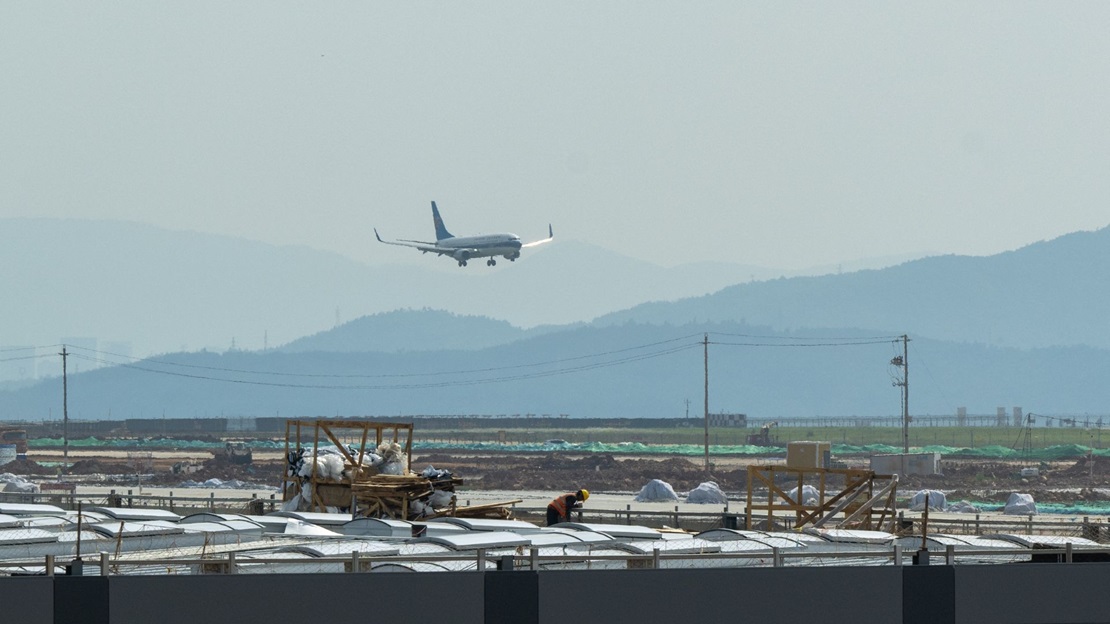In December 2024, the Kunming Changshui International Airport received four stars –the highest possible rating among all airports in China – in the year’s “Dual Carbon Airport” star rating evaluation announced by the China Civil Airports Association.1 Kunming Airport was only one of three airports awarded a four-star rating, the other two being the Shanghai Pudong Airport and the Shanghai Hongqiao Airport. It was recognized for its exceptional performance in planning leadership, institutional development, project implementation and promotion. This accomplishment signifies a significant milestone in its commitment to green and low-carbon development.
Kunming Airport’s green and low-carbon development was supported in part by financing from the Asian Infrastructure Investment Bank, in partnership with the Yunnan Provincial Government. Working with the Yunnan Airport Group (YAG), AIIB was keen to support Kunming Airport become a leader and role model for a sustainable, low-carbon and smart airport in China.
AIIB engaged the Singapore Changi Airport Group, a renowned industry leader in green airport development, to develop a comprehensive green airport assessment framework integrating local and international standards and propose tailored decarbonization action plans for Kunming Airport. AIIB financing also supported the building of airside infrastructure, including the construction of smart runways, lighting and navigation systems, electrified ground-handling vehicles and chargers, civil works and noise monitoring equipment, as well as technical support and capacity building to support the green development of the airport.
In addition, AIIB is supporting the establishment of an airport carbon management platform integrating the monitoring, reporting and analysis of the airport operational carbon footprint. The system allows the real-time gathering and analysis of data to enhance the carbon reduction strategies and management and support the continuous improvement of the airport's energy management capabilities.
According to Anzheng Wei, Senior Investment Officer at AIIB: “The project highlights the Bank’s value addition in fostering exceptional collaboration between AIIB members and industry frontrunners. One of the key lessons learned is the effective utilization of knowledge transfer to support the client attain higher development goals.”
Kunming Airport, which was also the first airport in China to receive certification for its CGC Carbon Management System, is committed to implementing energy-saving and emission reduction strategies to lower carbon emissions, reduce pollution and enhance green practices. In this, it is aligned with AIIB’s climate goals. As part of its commitment to support the Paris Agreement and to help cover the financing gap for climate finance, AIIB has resolved that 50% of its overall approved financing by 2025 will be directed toward climate finance toward projects such as the greening of the Kunming Airport.
"Prior to AIIB's involvement, we had already integrated various green elements into the design, construction and operations. However, our focus was primarily on technical solutions within our capacity. AIIB's contribution has provided us with a global perspective and expertise, which has greatly inspired us, especially with new approaches in green airport development and gender equity" stated Su’e Li, Deputy Director, Planning and Operation Department, YAG. "We are now more confident in setting ambitious targets for ourselves and are determined to become a sustainability benchmark for other airports in China and beyond."
Implementation of the project started immediately after AIIB’s approval of the project in August 2023. In parallel with the ongoing construction of physical infrastructures, a decarbonization roadmap for Kunming Airport is being developed. The AIIB team has been facilitating knowledge exchanges with other international airports on their advanced experience in green and low-carbon management, introducing internationally recognized standards and practices, benchmarking with international standards and helping Kunming Airport to develop its own low carbon target and green development pathway.
In addition, AIIB also advocates for gender inclusivity in its projects. At the Kunming Airport, the number of women workers and participation rates for both local (15.2%) and migrant workers (22.1%) are surpassing the targeted baseline of 8%.
Airports play a crucial role in today's development as they facilitate the connection of people, stimulate economic expansion and contribute to the flourishing of local and global communities. The Kunming Airport project serves as a testament to AIIB's capacity to be a strategic ally, aiding clients in accessing best-in-class global expertise to achieve their strategic goals and prioritize sustainability. Wei observed, “This standalone project demonstrates AIIB’s proficiency in financing complex projects, mobilizing resources and driving growth as a positive influencer to assist the industry in addressing critical climate challenges.”
The project marks one of the Bank’s first investments in the airport sector, covering almost all essential infrastructure of the airport. Moreover, AIIB's backing of the sustainable development of this Project sets a precedent for peer airports in China and promotes the adoption of green principles and practices across the industry. As noted by Jianquan Yang, Deputy Chief Commander, Kunming International Aviation Hub Construction Headquarters: “This project has had an undeniable influence in driving policy reform within the civil aviation sector. Due to our team's unanimous agreement on the benefits of AIIB's procurement rules and procedures, we have consciously implemented AIIB rules in certain non-AIIB funded procurements. As a result of adopting AIIB's procurement policy in this project, authorities are currently evaluating the existing national regulations and policies, taking into consideration the best practices promoted by the project."
1 A "dual carbon certificate" refers to a certification signifying that the airport is actively working towards achieving China's "dual carbon" goals, or alignment with the national targets such as peak carbon emissions by 2030 and carbon neutrality by 2060. It is the domestic equivalent of the Green Airport Certification awarded by the Airports Council International.


